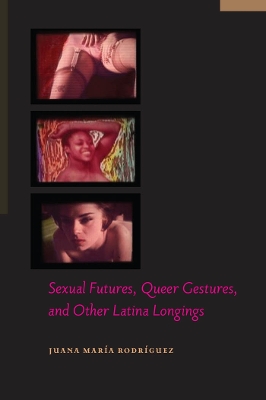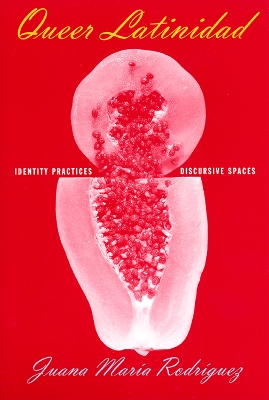Sexual Cultures
2 total works
Sexual Futures, Queer Gestures, and Other Latina Longings
by Juana Maria Rodriguez
Winner of the Alan Bray Memorial Book Prize presented by the GL/Q Caucus of the Modern Language Association
Finalist for the 2015 LGBT Studies Award presented by the Lambda Literary Foundation
Sexual Futures, Queer Gestures and Other Latina Longings proposes a theory of sexual politics that works in the interstices between radical queer desires and the urgency of transforming public policy, between utopian longings and everyday failures. Considering the ways in which bodily movement is assigned cultural meaning, Juana María Rodríguez takes the stereotypes of the hyperbolically gestural queer Latina femme body as a starting point from which to discuss how gestures and forms of embodiment inform sexual pleasures and practices in the social realm.
Centered on the sexuality of racialized queer female subjects, the book’s varied archive—which includes burlesque border crossings, daddy play, pornography, sodomy laws, and sovereignty claims—seeks to bring to the fore alternative sexual practices and machinations that exist outside the sightlines of mainstream cosmopolitan gay male culture. Situating articulations of sexual subjectivity between the interpretive poles of law and performance, Rodríguez argues that forms of agency continually mediate among these various structures of legibility—the rigid confines of the law and the imaginative possibilities of the performative. She reads the strategies of Puerto Rican activists working toward self-determination alongside sexual performances on stage, in commercial pornography, in multi-media installations, on the dance floor, and in the bedroom. Rodríguez examines not only how projections of racialized sex erupt onto various discursive mediums but also how the confluence of racial and gendered anxieties seeps into the gestures and utterances of sexual acts, kinship structures, and activist practices.
Ultimately, Sexual Futures, Queer Gestures, and Other Latina Longings reveals —in lyrical style and explicit detail—how sex has been deployed in contemporary queer communities in order to radically reconceptualize sexual politics.
An examination into queer identity in relation to Latino/a America
According to the 2000 census, Latinos/as have become the largest ethnic minority group in the United States. Images of Latinos and Latinas in mainstream news and in popular culture suggest a Latin Explosion at center stage, yet the topic of queer identity in relation to Latino/a America remains under examined.
Juana María Rodríguez attempts to rectify this dearth of scholarship in Queer Latinidad: Identity Practices, Discursive Spaces, by documenting the ways in which identities are transformed by encounters with language, the law, culture, and public policy. She identifies three key areas as the project’s case studies: activism, primarily HIV prevention; immigration law; and cyberspace. In each, Rodríguez theorizes the ways queer Latino/a identities are enabled or constrained, melding several theoretical and methodological approaches to argue that these sites are complex and dynamic social fields.
As she moves the reader from one disciplinary location to the other, Rodríguez reveals the seams of her own academic engagement with queer latinidad. This deftly crafted work represents a dynamic and innovative approach to the study of identity formation and representation, making a vital contribution to a new reformulation of gender and sexuality studies.

